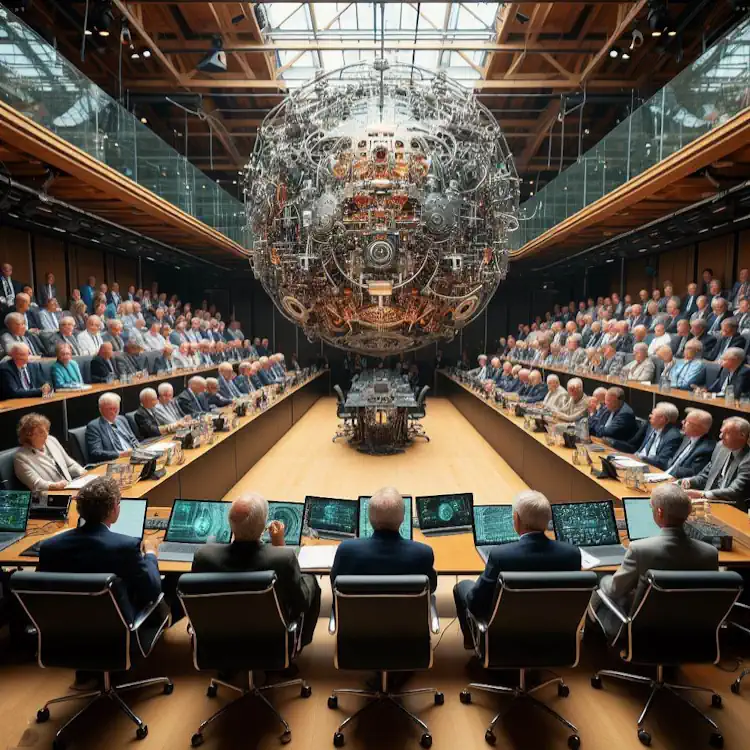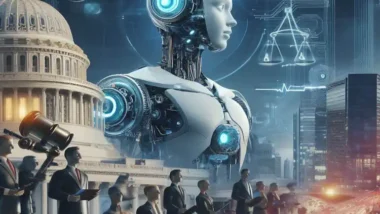Table of Contents
- 1 The Dawn of AI Diplomacy
- 2 Star-Studded Attendance and Notable Absences
- 3 Unprecedented International Cooperation
- 4 U.S. Asserts Influence Over AI’s Future
- 5 Elon Musk’s Spotlight at the Summit
- 6 AI’s Existential Threat Debated Amidst Democratic Concerns
- 7 Regulatory Rivalries and the Quest for AI Governance
The Dawn of AI Diplomacy
Prime Minister Rishi Sunak has spearheaded a groundbreaking artificial intelligence summit, marking a significant diplomatic stride with the creation of an international declaration aimed at mitigating AI risks. This high-profile event at Bletchley Park, the historical site of World War II codebreaking, drew an impressive roster of attendees from global leaders to tech moguls, showcasing both political and commercial muscle.
Star-Studded Attendance and Notable Absences
Despite the absence of some key figures like Emmanuel Macron and Joe Biden, the summit was anything but lackluster. U.S. Vice-President Kamala Harris, European Commission President Ursula von der Leyen, and tech titan Elon Musk were among the luminaries contributing to the event’s gravitas.
The conference’s success was underscored by the participation of more than 25 countries and the European Union, with France set to host the next AI safety summit in 2024.
Unprecedented International Cooperation
The gathering’s achievements included an international commitment to evaluate advanced AI models and the endorsement of a United Nations-supported expert AI panel, similar to the Intergovernmental Panel on Climate Change. This collaborative spirit extended to major tech companies who agreed to work with governments on testing AI technologies.
U.S. Asserts Influence Over AI’s Future
The White House underscored its pivotal role in shaping the AI landscape with an executive order from President Biden and a speech by Vice-President Harris in London. The U.S. initiatives, including the launch of an AI safety institute, highlight the nation’s dual commercial and political prowess in the AI arena.
Elon Musk’s Spotlight at the Summit
Elon Musk’s attendance added a layer of celebrity to the summit, with his stark warning about AI’s potential dangers capturing significant attention. While some viewed Musk’s presence as a nod to the Fear of Missing Out (FOMO) phenomenon, it undeniably magnified the event’s profile.
AI’s Existential Threat Debated Amidst Democratic Concerns
The summit did not resolve the contentious debate over whether AI poses an existential threat to humanity. However, there was a shared sense of urgency regarding the potential misuse of AI in disinformation campaigns, especially with upcoming elections in the U.S., India, and the UK. Nick Clegg of Meta expressed concerns about the immediate risks to democratic processes.
Regulatory Rivalries and the Quest for AI Governance
Delegates from around the globe were eager to demonstrate leadership in AI regulation. While the European Union is advancing its AI legislative framework, UK officials remain skeptical about the feasibility of regulation given the rapid pace of technological advancement. Nonetheless, there is a shared recognition of the value of international dialogue, with many calling for a scientific consensus on AI capabilities akin to the climate change panel.
As the summit concluded, the message was clear: international collaboration is key in shaping the responsible development and deployment of artificial intelligence. The stage is set for ongoing discussions and actions to ensure that AI serves the greater good, with all eyes now turning towards the next summit in France.


